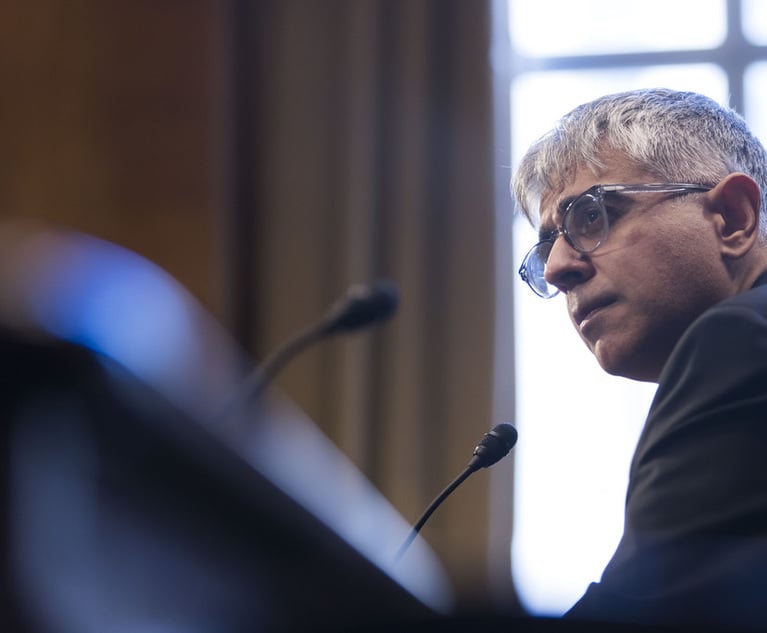Del. House Bill Proposes 1 Electoral College Vote for Each County
The move would likely put at least one electoral vote in the Republican column, that of Sussex County downstate, which has voted for the GOP national tickets in 2008, 2012 and 2016—in the first two of those elections with Biden as the Democratic vice presidential nominee.
June 22, 2020 at 06:00 PM
6 minute read
The original version of this story was published on Delaware Law Weekly
 Former Vice President of the United States Joe Biden walking with supporters at a pre-Wing Ding march from Molly McGowan Park in Clear Lake, Iowa. Photo: Pix_Arena/Shutterstock.com
Former Vice President of the United States Joe Biden walking with supporters at a pre-Wing Ding march from Molly McGowan Park in Clear Lake, Iowa. Photo: Pix_Arena/Shutterstock.com
Legislation introduced in Delaware's House of Representatives last week proposed making the state, home of Democratic presidential candidate Joe Biden, the third in the nation to not give all of its electoral college votes to the presidential candidate who wins the popular vote statewide.
If passed into law, House Bill 257, sponsored by state Rep. Stephen Smyk, R-Milton, and Sen. Dave Lawson, R-Marydel, would allocate one of Delaware's three presidential electors to each of its three counties based on the popular vote in each respective county.
The move would likely put at least one electoral vote in the Republican column, that of Sussex County downstate, which has voted for the GOP national tickets in 2008, 2012 and 2016—in the first two of those elections with Biden as the Democratic vice presidential nominee. Kent County voted for President Donald Trump in 2016, but for the Democrats in 2008 and 2012,
Statewide, Democratic presidential tickets have secured Delaware's three electoral votes in every general election since 1992, each time by margins of more than 10%.
Smyk said he introduced the bill June 18 in response to hearing constituents' dissatisfaction with the prospect of the National Popular Vote bill, which was signed into law by Gov. John Carney last year, joining Delaware with 14 other states and Washington, D.C., in an effort to elect the president based on a nationwide popular vote rather than the electoral college system.
"Once it passed, some people looked into it and realized that it wasn't their vote," Smyk said Monday. "It was surrendering its three electoral votes to whatever won throughout the nation, so no longer did it matter what Delaware voted for. Delaware voluntarily gave up its three electoral votes to the rest of the nation. And it was disheartening for some, because they felt duped."
The state, similar to 47 others, currently gives all of its electoral votes to one presidential candidate. Maine and Nebraska are the only two states that currently don't use a winner-take-all system, with one vote allotted for each of those states' congressional districts, instead. Unlike the system proposed in H.B. 357, those states also give two electoral votes to the winner of the statewide popular vote, and their congressional districts are divided into areas with roughly equal populations.
Delaware's electoral college votes have not been cast toward a Republican presidential candidate since 1988, according to data from the Office of the State Election Commissioner. In that time, the winner of the popular vote in New Castle County, where about 60% of the state's population resides, was always the winner of the statewide popular vote.
That data shows voters in New Castle County have favored Democratic presidential candidates almost exclusively over the past three decades, while those in Sussex County have historically leaned consistently toward Republican candidates. Kent County voters have favored candidates from both major parties fairly equally over time.
Smyk, who represents the state's 20th representative district, located in eastern and central Sussex County, said his goal is simply to advocate for the people of that area.
"That's who I represent. That's my voice in Delaware," he said. "I don't represent Wilmington; I represent Delaware and that little part of Delaware in Delaware's Legislature. So I've got to serve them."
The bill's synopsis states the suggested system "would be unique and proportional, better reflecting the will of the individual Delawarean with greater accuracy and independent strength of geographic location for all Delawareans, not just those in the densely populated areas in this nation or State."
Alan Garfield, a professor at Widener University Delaware Law School, said the system proposed in H.B. 257 would be counterproductive to the most common complaint about the electoral college: that a candidate could receive the popular vote but still lose an election.
"Putting aside the constitutional issues for doing this, it does seem like it's taking a bad system and making it even worse," Garfield said. "As a matter of constitutional law, as the courts have interpreted, the congressional districts must be allocated on a one person, one vote basis, so they should be relatively equal in population. The case law requires that."
If Delaware had historically used the system proposed in H.B. 257, roughly equal numbers of votes would have gone to Republican and Democratic candidates over the course of the past eight presidential elections. And if Delaware voters this November fall along the same party lines they did in the 2016 election, Democratic presidential candidate Joe Biden would receive just one of the three votes from his home state. That's because in 2016, Kent and Sussex voted for Trump with populous New Castle voting for Hillary Clinton, the Democrat.
"This, in effect, would give greater weight to less populated counties, perhaps in an extreme sense, as some of them are quite a bit smaller," Garfield said. "And so it just exacerbates the problem of giving some people disproportionate voting power versus other citizens of Delaware, and so I can't imagine any logic for doing that … It seems like it would just be an open invitation of abuse."
All the legislators currently sponsoring the bill represent districts entirely or partially in either Kent or Sussex counties. Smyk said though all eight are Republicans, he's spoken to legislators from both major political parties about H.B. 257, and his support for the bill is not based on partisanship.
After the seminal 1962 Baker v. Carr decision establishing the principle that it could weigh in on the size of state legislative districts, the U.S. Supreme Court followed up with several more voting rights rulings. They included Reynolds v. Sims, mandating that under the 14th Amendment's equal protection clause, state legislative electoral districts must have roughly equal populations, with each person's vote in a state election equal to everyone else's
The Constitution gives states broad authority to determine on an individual basis how they want to determine the distribution of electoral college votes. With Reynolds v. Sims applying specifically to electoral districts for a state's legislature, rather than a state's authority to create districts to be considered in a federal election, Garfield said if H.B. 257 were to become law and was eventually challenged in a court, the proportional voting rule would likely be weighed against the state's right to design its own system for distributing electoral college votes
This content has been archived. It is available through our partners, LexisNexis® and Bloomberg Law.
To view this content, please continue to their sites.
Not a Lexis Subscriber?
Subscribe Now
Not a Bloomberg Law Subscriber?
Subscribe Now
NOT FOR REPRINT
© 2025 ALM Global, LLC, All Rights Reserved. Request academic re-use from www.copyright.com. All other uses, submit a request to [email protected]. For more information visit Asset & Logo Licensing.
You Might Like
View All
What Went Wrong With Adeel Mangi's Long, Strange Trip Through the Judicial Nomination Process?
6 minute read
Democrats Give Up Circuit Court Picks for Trial Judges in Reported Deal With GOP


FTC Goes After AI Tool That Has Capability to Mass Produce Fake Reviews
6 minute readTrending Stories
- 1Reviewing Judge Merchan's Unconditional Discharge
- 2With New Civil Jury Selection Rule, Litigants Should Carefully Weigh Waiver Risks
- 3Young Lawyers Become Old(er) Lawyers
- 4Caught In the In Between: A Legal Roadmap for the Sandwich Generation
- 5Top 10 Developments, Lessons, and Reminders of 2024
Who Got The Work
J. Brugh Lower of Gibbons has entered an appearance for industrial equipment supplier Devco Corporation in a pending trademark infringement lawsuit. The suit, accusing the defendant of selling knock-off Graco products, was filed Dec. 18 in New Jersey District Court by Rivkin Radler on behalf of Graco Inc. and Graco Minnesota. The case, assigned to U.S. District Judge Zahid N. Quraishi, is 3:24-cv-11294, Graco Inc. et al v. Devco Corporation.
Who Got The Work
Rebecca Maller-Stein and Kent A. Yalowitz of Arnold & Porter Kaye Scholer have entered their appearances for Hanaco Venture Capital and its executives, Lior Prosor and David Frankel, in a pending securities lawsuit. The action, filed on Dec. 24 in New York Southern District Court by Zell, Aron & Co. on behalf of Goldeneye Advisors, accuses the defendants of negligently and fraudulently managing the plaintiff's $1 million investment. The case, assigned to U.S. District Judge Vernon S. Broderick, is 1:24-cv-09918, Goldeneye Advisors, LLC v. Hanaco Venture Capital, Ltd. et al.
Who Got The Work
Attorneys from A&O Shearman has stepped in as defense counsel for Toronto-Dominion Bank and other defendants in a pending securities class action. The suit, filed Dec. 11 in New York Southern District Court by Bleichmar Fonti & Auld, accuses the defendants of concealing the bank's 'pervasive' deficiencies in regards to its compliance with the Bank Secrecy Act and the quality of its anti-money laundering controls. The case, assigned to U.S. District Judge Arun Subramanian, is 1:24-cv-09445, Gonzalez v. The Toronto-Dominion Bank et al.
Who Got The Work
Crown Castle International, a Pennsylvania company providing shared communications infrastructure, has turned to Luke D. Wolf of Gordon Rees Scully Mansukhani to fend off a pending breach-of-contract lawsuit. The court action, filed Nov. 25 in Michigan Eastern District Court by Hooper Hathaway PC on behalf of The Town Residences LLC, accuses Crown Castle of failing to transfer approximately $30,000 in utility payments from T-Mobile in breach of a roof-top lease and assignment agreement. The case, assigned to U.S. District Judge Susan K. Declercq, is 2:24-cv-13131, The Town Residences LLC v. T-Mobile US, Inc. et al.
Who Got The Work
Wilfred P. Coronato and Daniel M. Schwartz of McCarter & English have stepped in as defense counsel to Electrolux Home Products Inc. in a pending product liability lawsuit. The court action, filed Nov. 26 in New York Eastern District Court by Poulos Lopiccolo PC and Nagel Rice LLP on behalf of David Stern, alleges that the defendant's refrigerators’ drawers and shelving repeatedly break and fall apart within months after purchase. The case, assigned to U.S. District Judge Joan M. Azrack, is 2:24-cv-08204, Stern v. Electrolux Home Products, Inc.
Featured Firms
Law Offices of Gary Martin Hays & Associates, P.C.
(470) 294-1674
Law Offices of Mark E. Salomone
(857) 444-6468
Smith & Hassler
(713) 739-1250






